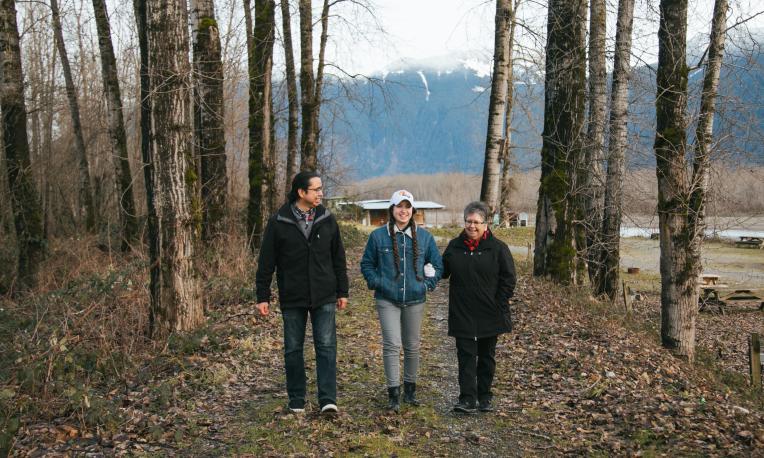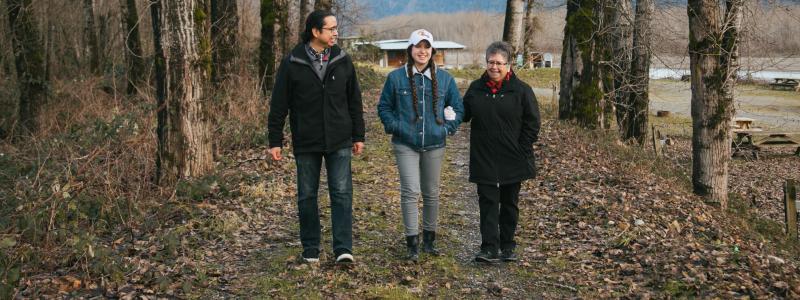"I celebrate the resiliency and courage of Indigenous women all over the world who see the challenges and look for ways to make changes. I celebrate the hope that is within each woman for a brighter future for the next generations. I celebrate the commitment of women to walk courageously and with integrity, knowing that others will follow in their footsteps."
— Patricia Victor, TWU University Siya:m and Co-Director of the Institute of Indigenous Issues & Perspectives
"New life is being breathed into an ancestral role held traditionally in First Nations culture by the community’s matriarchs," said Patricia Victor, Stó:lo elder and TWU's University Siya:m.
Victor is referring to Bill C-92. In March 2019, Bill C-92, the historic legislation described as “an Act respecting First Nations, Inuit and Metis children, youth, and families,” became part of Canadian law.
This legislation unlocks the door for Coast Salish matriarchs to reclaim their jurisdiction for children and families.
"The Coast Salish matriarchs are ready to reclaim control of child welfare services from the federal government," Victor said.
Reclaiming the ancestral role of matriarchs
During March 2021's Women's History Month, Victor explains that women have historically played a major role in all matters of Indigenous community.
"However, the colonial system imposed upon the Indigenous people have displaced much of the influence," she said. "But Indigenous women are courageous and resilient to find ways to make changes."
She explained that it was through the combined efforts of Indigenous leadership and the leadership of Hon. Jane Philpott and Hon. Jody Wilson-Raybould that advocated for and supported legislation, opening the door for Indigenous communities to reclaim the ancestral role of matriarchs.
Women in the Stó:lo worldview
In the Stó:lo worldview, the concept of matriarch refers to the eldest woman, or the woman recognized by the family as their matriarch, who carries the thread of family history and culture, as well as the ceremonial and naming rights of her family.
Victor says there are many women within Sto:lo territory who are role models. "I have the privilege of hearing their stories, and of seeing their integrity and their relentless hard work and vision for the next generations," she said.
"I think of my maternal great-grandmother, grandmother and my mom, who overcame challenges placed upon them through the Indian Act legislation that denied Indigenous women the right to be Indigenous when they married non-Indigenous men," she said. "I think of teachers, nurses, and lawyers, who passed as anything other than Indigenous, in order to serve in their professional roles—they made that personal sacrifice to serve others."
She continues, "I think of the thousands of murdered and missing Indigenous women and girls and their families who continue to hope, who grieve their loss, and who work for justice for the lives of their loved ones."
"I think of the thousands of women who endured through the atrocities of Indian Residential Schools and through the mistreatment during the 60’s scoop. Many of these women have overcome the trauma and continue to reach out to others who are still on their journey of healing and wholeness."
"I think of other women involved in genealogy to help the next generations. Those who have not had the benefit of knowing their family story and their rich inheritance because of intergenerational trauma. I think of those who overcame historical trauma, to re-enter the education system to be equipped to support the Indigenous community in the areas of health, education, law, and language."
Finally, to name one hero from Cheam First Nation, B.C., where Victor lives, Victor said, "I think of Siyamiyateliyot."
Siyamiyateliyot (Elizabeth Philips), even though she is in her 80’s, continues to work to keep the Halq’eméylem language alive. For her efforts to ensure that current and future generations can speak the language, the University of the Fraser Valley recognized Elizabeth with an honorary Doctor of Letters degree in 2018.
Honouring women past and present
During Women’s History Month, there is much that Victor wishes to celebrate.
"I celebrate the resiliency and courage of Indigenous women all over the world who see the challenges and look for ways to make changes. I celebrate the hope that is within each woman for a brighter future for the next generations. I celebrate the commitment of women to walk courageously and with integrity, knowing that others will follow in their footsteps," Victor said.

About Trinity Western University
Founded in 1962, Trinity Western University is Canada’s premier Christian liberal arts university dedicated to equipping students to establish meaningful connections between career, life, and the needs of the world. It is a fully accredited research institution offering liberal arts and sciences, as well as professional schools in business, nursing, education, human kinetics, graduate studies, and arts, media, and culture. It has five campuses and locations: Langley, Richmond-Lansdowne, Richmond-Minoru, Ottawa, and Bellingham, WA. TWU emphasizes academic excellence, research, and student engagement in a vital faith community committed to forming leaders to have a transformational impact on culture. Learn more at www.twu.ca or follow us on Twitter @TrinityWestern, on Facebook and LinkedIn.
For media inquiries, please contact: media@twu.ca

